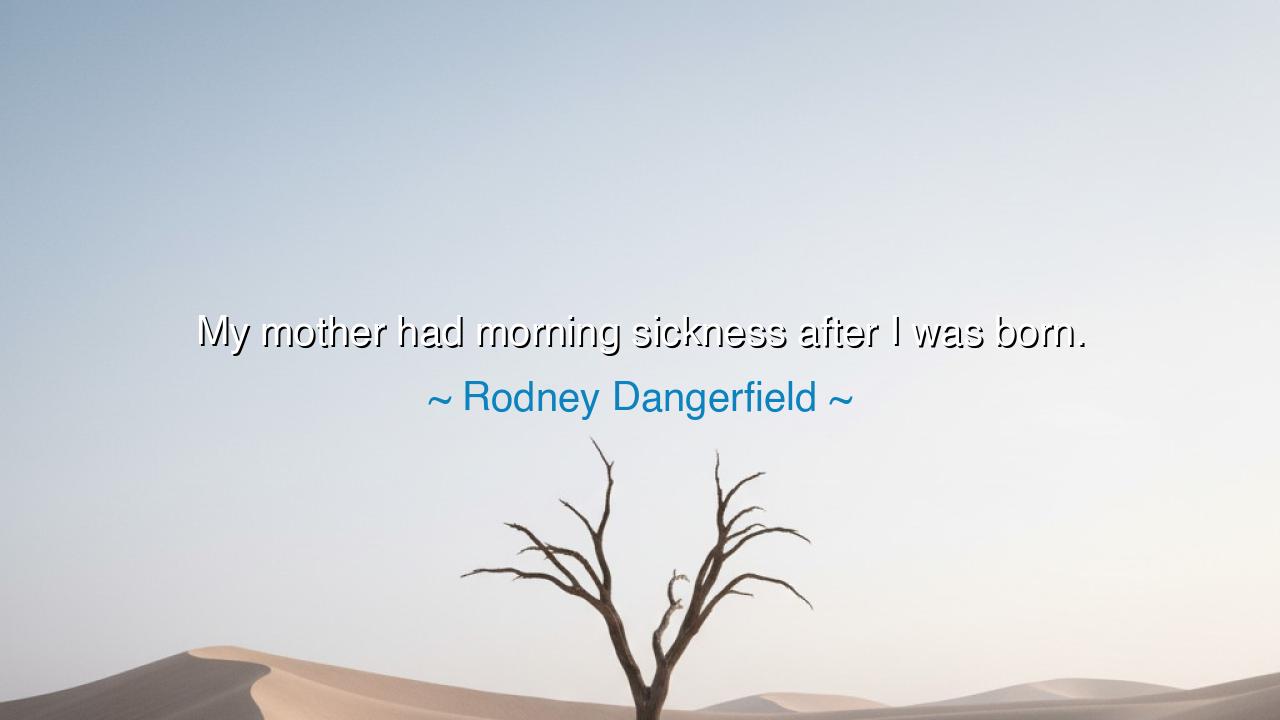
My mother had morning sickness after I was born.






Hear the voice of Rodney Dangerfield, master of wit and self-mockery, who once declared with piercing humor: “My mother had morning sickness after I was born.” At first, these words seem but a jest, a line crafted to stir laughter. Yet beneath the veil of comedy lies a truth both tender and profound: the use of humor as shield, as sword, and as balm against the weight of existence. In one stroke, Dangerfield turns sorrow into laughter, rejection into performance, and pain into something that can be shared by many.
The meaning of his remark lies in exaggeration, in self-deprecation so sharp that it becomes universal. To say that his mother felt sick after his birth is, of course, absurd. But in this absurdity, he voices a deeper human fear—that of not being wanted, not being enough, not being embraced. Through comedy, he transforms what might otherwise wound the soul into a story that unites the audience in laughter. In mocking himself, he allows others to confront their own insecurities and find release. For what is laughter, if not the soul’s recognition that even pain can be reshaped into joy?
The origin of this kind of humor is ancient. The philosophers of Greece, such as Diogenes the Cynic, used mockery to expose both themselves and the society around them. The jesters of medieval courts were licensed to speak truths no counselor dared utter, veiling them in jokes. Dangerfield follows this lineage: the comedian as sage, the joker as truth-teller, the man who lowers himself in words so that all who listen may rise in spirit. Self-deprecating humor has always been the most disarming, for it demands no victim but oneself, and yet it heals the hearts of many.
Consider the story of Abraham Lincoln, who, though burdened with the gravest duties of leadership, often turned to humor to disarm critics and lighten the weight of war. When accused by rivals of being two-faced, he quipped: “If I had another face, do you think I would wear this one?” Like Dangerfield, Lincoln wielded humor to make light of himself, yet in so doing, he gained the affection and trust of those around him. Such words remind us that even in positions of trial, humor can be a bridge between souls.
The lesson is this: when life brings you rejection, ridicule, or feelings of inadequacy, you may respond with bitterness, or you may respond with laughter. To laugh is not to deny pain, but to master it. Dangerfield’s quip teaches us that even our deepest insecurities can be reshaped into sources of connection. When we admit our weakness with humor, we strip it of its power to wound us. And when we laugh at ourselves, we invite others to do the same—not in scorn, but in camaraderie.
Practical actions flow from this wisdom. When you feel diminished, practice the art of humor. Tell your story with a smile. Take the sharpness of pain and turn it into the warmth of laughter. Do not allow pride to chain you to the illusion of perfection, but embrace humility and absurdity. In conversations, use humor not to belittle others, but to uplift them, to show that flaws are common to all. In so doing, you lighten not only your own burdens but those of all who walk beside you.
And so, child of tomorrow, remember the hidden fire in Dangerfield’s jest: “My mother had morning sickness after I was born.” It is not merely a joke, but a philosophy. Life will wound you, yes—but you can turn wounds into words, sorrow into laughter, and isolation into fellowship. Walk, then, with humility and humor. Laugh at yourself often, for in that laughter lies freedom, resilience, and the quiet courage to endure all things.






AAdministratorAdministrator
Welcome, honored guests. Please leave a comment, we will respond soon